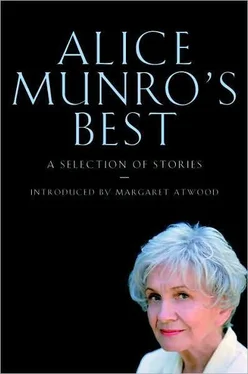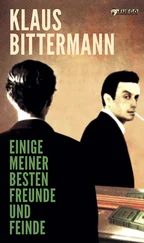Accidents all the time then. In the mill. Foundry. Wasn’t the precautions.
“You didn’t have so many strikes then, I don’t suppose? You didn’t have so many unions?”
Everybody taking it easy nowadays. We worked and we was glad to get it. Worked and was glad to get it.
“You didn’t have television.”
Didn’t have no TV. Didn’t have no radio. No picture show.
“You made your own entertainment.”
That’s the way we did.
“You had a lot of experiences young men growing up today will never have.”
Experiences.
“Can you recall any of them for us?”
I eaten groundhog meat one time. One winter. You wouldna cared for it. Heh.
There was a pause, of appreciation, it would seem, then the announcer’s voice saying that the foregoing had been an interview with Mr. Wilfred Nettleton of Hanratty, Ontario, made on his hundred and second birthday, two weeks before his death, last spring. A living link with our past. Mr. Nettleton had been interviewed in the Wawanash County Home for the Aged.
Hat Nettleton.
Horsewhipper into centenarian. Photographed on his birthday, fussed over by nurses, kissed no doubt by a girl reporter. Flashbulbs popping at him. Tape recorder drinking in the sound of his voice. Oldest resident. Oldest horsewhipper. Living link with our past.
Looking out from her kitchen window at the cold lake, Rose was longing to tell somebody. It was Flo who would enjoy hearing. She thought of her saying Imagine! in a way that meant she was having her worst suspicions gorgeously confirmed. But Flo was in the same place Hat Nettleton had died in, and there wasn’t any way Rose could reach her. She had been there even when that interview was recorded, though she would not have heard it, would not have known about it. After Rose put her in the Home, a couple of years earlier, she had stopped talking. She had removed herself, and spent most of her time sitting in a corner of her crib, looking crafty and disagreeable, not answering anybody, though she occasionally showed her feelings by biting a nurse.
PATRICK BLATCHFORD was in love with Rose. This had become a fixed, even furious, idea with him. For her, a continual surprise. He wanted to marry her. He waited for her after classes, moved in and walked beside her, so that anybody she was talking to would have to reckon with his presence. He would not talk when these friends or classmates of hers were around, but he would try to catch her eye, so that he could indicate by a cold incredulous look what he thought of their conversation. Rose was flattered, but nervous. A girl named Nancy Falls, a friend of hers, mispronounced Metternich in front of him. He said to her later, “How can you be friends with people like that?”
Nancy and Rose had gone and sold their blood together, at Victoria Hospital. They each got fifteen dollars. They spent most of the money on evening shoes, tarty silver sandals. Then because they were sure the bloodletting had caused them to lose weight, they had hot fudge sundaes at Boomers. Why was Rose unable to defend Nancy to Patrick?
Patrick was twenty-four years old, a graduate student, planning to be a history professor. He was tall, thin, fair, and good-looking, though he had a long pale-red birthmark, dribbling like a tear down his temple and his cheek. He apologized for it, but said it was fading as he got older. When he was forty, it would have faded away. It was not the birthmark that cancelled out his good looks, Rose thought. (Something did cancel them out, or at least diminish them, for her; she had to keep reminding herself they were there.) There was something edgy, jumpy, disconcerting about him. His voice would break under stress — with her, it seemed he was always under stress — he knocked dishes and cups off tables, spilled drinks and bowls of peanuts, like a comedian. He was not a comedian; nothing could be further from his intentions. He came from British Columbia. His family was rich.
He arrived early to pick Rose up, when they were going to the movies. He wouldn’t knock, he knew he was early. He sat on the step outside Dr. Henshawe’s door. This was in the winter, it was dark out, but there was a little coach lamp beside the door.
“Oh, Rose! Come and look!” called Dr. Henshawe, in her soft, amused voice, and they looked down together from the dark window of the study. “The poor young man,” said Dr. Henshawe tenderly. Dr. Henshawe was in her seventies. She was a former English professor, fastidious and lively. She had a lame leg, but a still youthfully, charmingly tilted head, with white braids wound around it.
She called Patrick poor because he was in love, and perhaps also because he was a male, doomed to push and blunder. Even from up here he looked stubborn and pitiable, determined and dependent, sitting out there in the cold.
“Guarding the door,” Dr. Henshawe said. “Oh, Rose!”
Another time she said disturbingly, “Oh, dear, I’m afraid he is after the wrong girl.”
Rose didn’t like her saying that. She didn’t like her laughing at Patrick. She didn’t like Patrick sitting out on the steps that way, either. He was asking to be laughed at. He was the most vulnerable person Rose had ever known; he made himself so, didn’t know anything about protecting himself. But he was also full of cruel judgments, he was full of conceit.
“YOU ARE A SCHOLAR, Rose,” Dr. Henshawe would say. “This will interest you.” Then she would read aloud something from the paper, or, more likely, something from Canadian Forum or the Atlantic Monthly. Dr. Henshawe had at one time headed the city’s school board, she was a founding member of Canada’s Socialist Party. She still sat on committees, wrote letters to the paper, reviewed books. Her father and mother had been medical missionaries; she had been born in China. Her house was small and perfect. Polished floors, glowing rugs, Chinese vases, bowls, and landscapes, black carved screens. Much that Rose could not appreciate, at the time.
She could not really distinguish between the little jade animals on Dr. Henshawe’s mantelpiece and the ornaments displayed in the jewelry-store window in Hanratty, though she could now distinguish between either of these and the things Flo bought from the five-and-ten. She could not really decide how much she liked being at Dr. Henshawe’s. At times she felt discouraged, sitting in the dining room with a linen napkin on her knee, eating from fine white plates on blue placemats. For one thing, there was never enough to eat, and she had taken to buying doughnuts and chocolate bars and hiding them in her room. The canary swung on its perch in the dining-room window and Dr. Henshawe directed conversation. She talked about politics, about writers. She mentioned Frank Scott and Dorothy Livesay. She said Rose must read them. Rose must read this, she must read that. Rose became sullenly determined not to. She was reading Thomas Mann. She was reading Tolstoy.
Before she came to Dr. Henshawe’s, Rose had never heard of the working class. She took the designation home.
“This would have to be the last part of town where they put the sewers,” Flo said.
“Of course,” Rose said coolly. “This is the working-class part of town.”
“ Working class?” said Flo. “Not if the ones around here can help it.”
Dr. Henshawe’s house had done one thing. It had destroyed the naturalness, the taken-for-granted background, of home. To go back there was to go quite literally into a crude light. Flo had put fluorescent lights in the store and the kitchen. There was also, in a corner of the kitchen, a floor lamp Flo had won at Bingo; its shade was permanently wrapped in wide strips of cellophane. What Dr. Henshawe’s house and Flo’s house did best, in Rose’s opinion, was discredit each other. In Dr. Henshawe’s charming rooms there was always for Rose the raw knowledge of home, an indigestible lump, and at home now her sense of order and modulation elsewhere exposed such embarrassing sad poverty in people who never thought themselves poor. Poverty was not just wretchedness, as Dr. Henshawe seemed to think, it was not just deprivation. It meant having those ugly tube lights and being proud of them. It meant continual talk of money and malicious talk about new things people had bought and whether they were paid for. It meant pride and jealousy flaring over something like the new pair of plastic curtains, imitating lace, that Flo had bought for the front window. That as well as hanging your clothes on nails behind the door and being able to hear every sound from the bathroom. It meant decorating your walls with a number of admonitions, pious and cheerful and mildly bawdy.
Читать дальше












